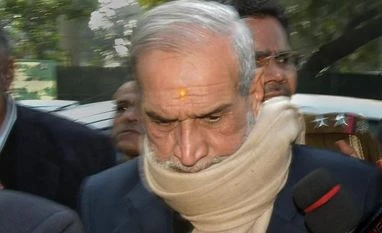The Supreme Court is scheduled to hear on January 14 the appeal filed by former Congress leader Sajjan Kumar challenging the Delhi High Court verdict convicting and sentencing him to life term in a 1984 anti-Sikh riots case.
73-year-old Kumar had surrendered before a trial court here on December 31, 2018 to serve the sentence in pursuance of the high court's December 17 judgement awarding him life imprisonment for the "remainder of his natural life".
After his conviction in the case, Kumar had resigned from the Congress party.
As per the list of business of the apex court for January 14, his appeal against the high court's verdict is scheduled to be heard by a bench headed by Chief Justice Ranjan Gogoi.
The case in which Kumar was convicted and sentenced relates to the killing of five Sikhs in Delhi Cantonment's Raj Nagar Part-I area of southwest Delhi on November 1-2, 1984 and burning down of a Gurudwara in Raj Nagar Part-II.
The anti-sikh riots had broken out after the assassination of then prime minister Indira Gandhi on October 31, 1984, by her two Sikh bodyguards.
Also Read
The high court had convicted and sentenced Kumar to spend the remainder of his life in jail for the offences of criminal conspiracy and abetment in commission of crimes of murder, promoting enmity between different groups on grounds of religion and doing acts prejudicial to maintenance of communal harmony and defiling and destruction of a Gurdwara.
It had also upheld the conviction and varying sentences awarded by a trial court to five others -- former Congress councillor Balwan Khokhar, retired naval officer Captain Bhagmal, Girdhari Lal and former MLAs Mahender Yadav and Kishan Khokhar.
In its judgment, the high court had noted that over 2,700 Sikhs were killed in the national capital during the 1984 riots which was indeed a "carnage of unbelievable proportions".
It had said the riots were a "crime against humanity" perpetrated by those who enjoyed "political patronage" and aided by an "indifferent" law enforcement agency.
The high court had set aside the trial court's 2010 verdict which had acquitted Kumar in the case.
)